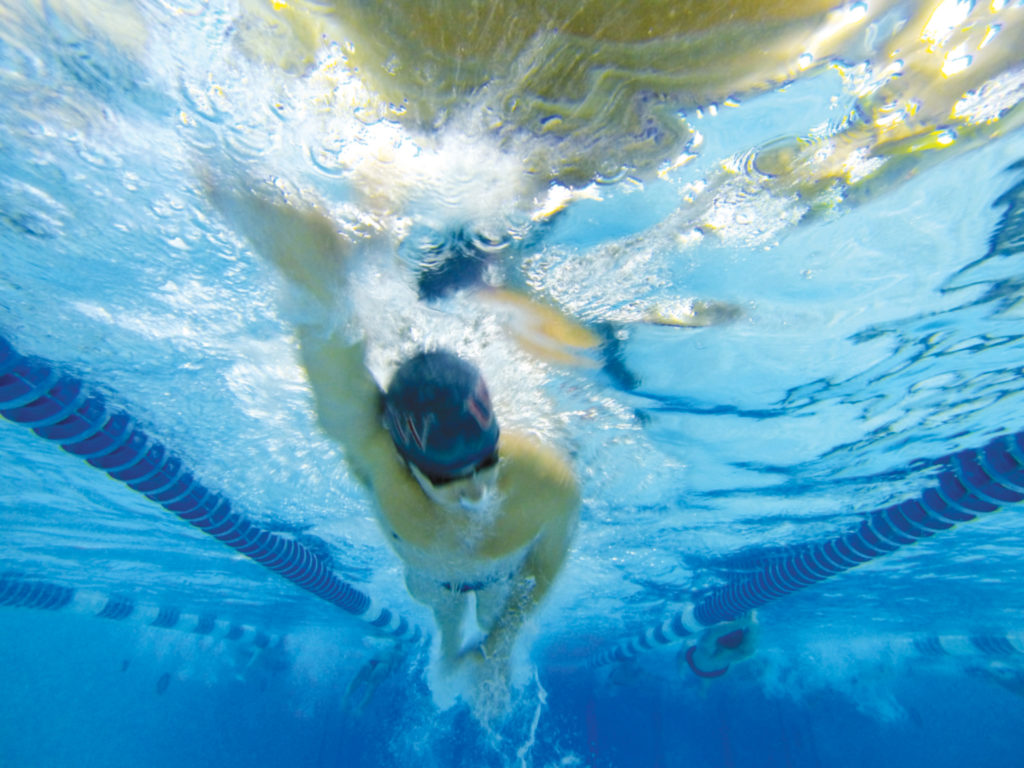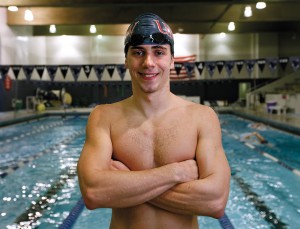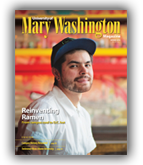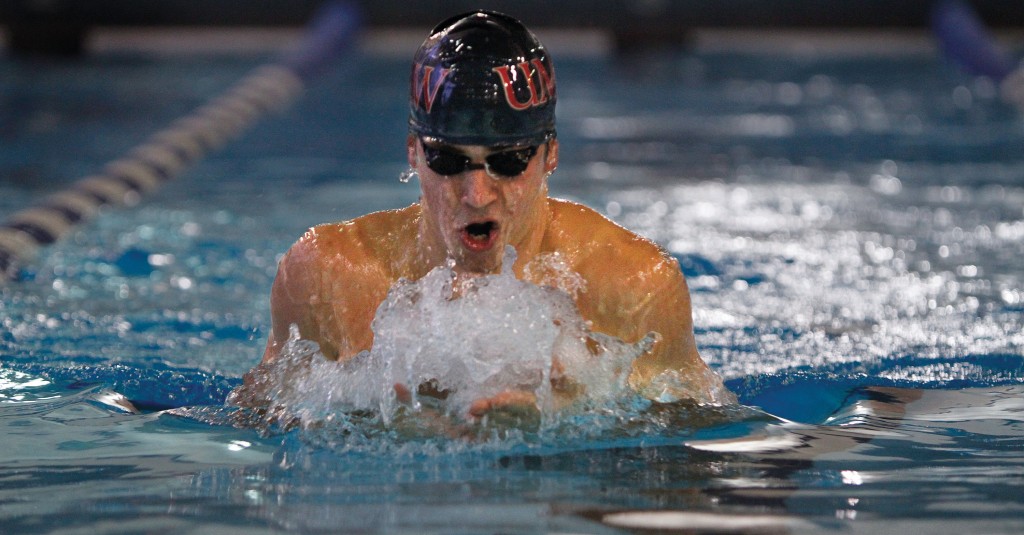
Alex Anderson veered off course after high school, but the record-setting sophomore, recently named Capital Athletic Conference Swimmer of the Year, is back on track at UMW. In March, he became the fourth individual NCAA national champion in UMW school history. He broke the NCAA Division III record in the 400-yard individual medley at the National Swimming and Diving Championships in Shenandoah, Texas.
When top Division I schools courted Alex Anderson ’15 for a swim scholarship in 2006, the high school senior wasn’t ready.
Recruiters from universities in such states as Alabama, Arizona, and Indiana saw a record-setting competitor who took two state titles in the 500-yard freestyle. Anderson saw a commitment to academics he wasn’t ready to make. He turned his back on school, and for a few years he lost his way − and his sport.
Seven years later he’s making a name for himself as a UMW student-athlete on the Eagles swim team. In February, the sophomore was named Capital Athletic Conference Swimmer of the Year at a meet in which he broke four individual school and conference records and swam in four record-breaking relays. He represented the University at the March NCAA Championships in Texas, becoming the fourth individual NCAA national champion in UMW school history.
Meanwhile, the water helped Anderson get his life on track.
“Swimming turned into a therapeutic sport for me,” said Anderson, who studies chemistry at Mary Washington. “By this I mean every time I jump in the pool I let all my troubles and worries float away. It seems like such a natural thing for me, like something I was born to do.”
After high school in Vienna, Va., Anderson enrolled at Northern Virginia Community College, NOVA, but he wasn’t interested in school. He often didn’t show up for classes, and his grades stayed low. His mother lost a battle with breast cancer in the summer of 2007; soon after that, he moved out of his father’s house.
Over the next two years, Anderson shared an apartment with roommates and worked low-wage jobs to pay the bills. He was a waiter, a cashier, a cook, and a carpenter’s apprentice. He managed a company that tended potted plants in offices and supermarkets.
It wasn’t the life he wanted. He realized he was squandering his talent and an opportunity for something better.
He talked to his father, and they formed a plan. Anderson would get serious − go back to school, bring up his grades, and get back in the pool. The son moved back in with his dad, joined a club team, and trained to get back in shape for competition.

When Division I college teams courted Anderson in 2006, he wasn’t ready to take the plunge. Now a sophomore at UMW, he headed to his second Division III NCAA Championship March 20-23, this time in Texas, for the 2013 competition. Anderson said swimming is something he “was born to do.”
Back at NOVA in spring 2010, Anderson retook several courses and signed up for something new − biology. The science class was his favorite, and he aced it. After that, he earned only A’s − grades that could get him into a four-year college.
With new confidence in his academic ability, he no longer wanted only to swim. He decided on a Division III school that would allow him the flexibility to develop his sport and his brain. The science program at University of Mary Washington had a great reputation, and it was close to home. He went for it.
Anderson talked to Eagles swim coach Abby Brethauer, was admitted by the University, and enrolled for classes in August 2011.
When he is in the lane with rivals, he changes from the carefree swimmer in training.
“I bring a different attitude to my racing and competitive swimming,” Anderson said. “I love to race. I can get competitive. I just want to win.”
Anderson and Eagles swimming were a great fit from the start. His first season, he was one of the fastest swimmers, leading the men’s team to its 12th consecutive CAC title.
He qualified for the NCAA Championships in the 50-yard freestyle, the 200-yard breaststroke, and the 400-yard individual medley. In his first NCAA Championship, he gained All-America status in the 400-yard individual medley with a ninth-place finish, easily winning the consolation final.
As he headed to the NCAA Championships again this year, he’s even faster, having just broken individual school and conference records in the 100- and 200-yard butterfly and the 50- and 200-yard freestyle. His relay teams – the 200-, 400-, and 800-yard freestyle and the 400-yard medley – also set school and conference records en route to the NCAAs.
“Alex has the potential not only to be the most successful swimmer in the history of UMW swimming, but also to turn what have until this point only been program goals into realities,” Brethauer said. “Not only is he a talented swimmer, he is also one of our top students − and he’s a great teammate. He is a wonderful example of what it means to be a Mary Washington student-athlete. He represents both our team and the entire department with aplomb.”
When Anderson started back to swimming, he scrutinized how he had trained, his stroke, and his performance, and found new ways to better old race times. He fell in love with chemistry for the challenge, too, he said. When he got a low score on his first quiz, he used the same skills he uses in the pool.
“I look at what I’ve done and how I can do better. I change it. Since [that quiz], I’ve tried 10 different types of study skills,” he said. “The biggest tool for success is to be willing to try new things and be able to change. You have to look back at what you’ve done to do that. Otherwise you might change for the worse.”

